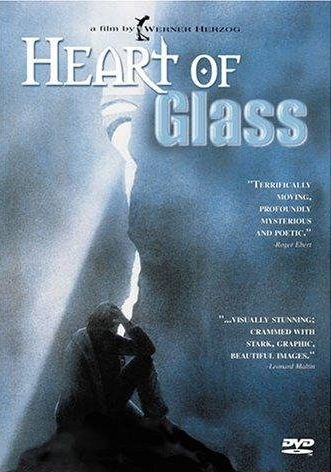
HEART OF GLASS
Germany, 1976, 94 minutes, Colour.
Josef Bierbichler, Stefan Guttler.
Directed by Werner Herzog.
A striking film by celebrated German director Werner Herzog. Herzog made his mark in German cinema during the seventies with strikingly original work. He began with experimental and subjective material in the late sixties and early seventies, for example Fata Morgana and Even Dwarfs Started Small. He has made documentaries like Land of Silence and Darkness.
In the seventies with greater resources he made subjective interpretations of reality in a cinematic poetic vein. He had partly ridiculed this style in his earlier films, but in the seventies began to use it for serious explorations of themes in a strikingly visual non-verbal way. This film is even more striking because the whole cast except for the leading player Josef Bierbichler, were hypnotised.
The setting is the Germany of the 18th century, a period he used for The Enigma of Kasper Hauser some years later. However, the straightforward narrative in moved in all directions as characters interact, poetic devices are used and
apocalyptic vision is created. Herzog himself says that the film should not be analysed - it should rather be responded to in terms of imagery and the image logic work on the imagination. Thematic significance should emerge from that experience. Heart of Glass is quite a difficult film but in the response to images it in more accessible than some of his earlier experiments.
1. The distinctive work of Werner Herzog? His cinematic techniques, experimentation, reliance on the visual? The significance of his hypnotising almost all the cast? Does this emerge from the film itself? His recreation of a period, his interpretation of a period and history and his taking the significance at for the present and the future? Themes of human nature, society, vision, disaster? The importance of images, response to cinematic poetry?
2. The structure of the film - the initial focus on Hias and his prophecy? The prophecy an a framework for the film? The focus on the village. the atmosphere of the end of the world? The glass makers and their seeking the secrets? The build-up of incidents, coincidences, life and death? The sideways movement of the screenplay? The finale and the vision of the future, the expedition seeking some solution? The final caption and significance? How well did the screen play involve the audience?
3. The apocalyptic atmosphere of the film, the end of the world, the signs and portents associated with hope and despair? The reason for an apocalyptic mentality? People frightened and dissatisfied with the present? Desperate hopes for the future? The madness of the apocalyptic vision? The bizarre behaviour, signs? Murder, mystery, cruelty? The reaction of people to disastrous situations? cruelty, imprisonment? The symptoms of a nick society? The sayings and their ominous significance? Hias and his visions, his loss of vision?
4. Herzog's recreation of the period - the beauty of nature, the life of the village, the blowing of the glass and its beauty in creation? The contrast with the ugliness in nature, in the town, the darkness and the shadows? The significance of these images of Germany of the 18th century and their relationship to later German history?
5. Hias and his role in the village? His vision of the new earth rising after time crumbling? The importance of the vision in the clouds? The giant being merely the shadow of a dwarf? Visions of fire at the glass factory? The liar and the thief crossing the bridge? Hias's interpretation? The two men and one smothering the other? The dance of death? The owner and the puzzle about the secret of the heart of glass? Hias and his loss of vision? The factories and the fortresses?
6. The owner of the factory and his management. his father and the secret? The shoes? The role of the servant and the decision to kill Ludmilla? Ludmilla and her being the victim? The harp? The desperation as the owner searched for the secret of the heart of glass, the books, the digging of the house, the burning, the prison? The paradox of this behaviour of a man seeking a solution?
7. The villagers and the way they wore portrayed, the focus on omens, giants and dwarfs? The workers and their behaviour at the factory? Society at the inn? The mockery, the naked girl? The music at the inn?
8. Presentation of the glass blowing - its beauty? Its supporting the village? The failures in their attempts to blow the glass properly? The laughter and mockery? The belief that blood from the maid would offer the solution? The apocalyptic vision of burning?
9. Hias and his imprisonment, the desertion of the prophetic gifts? His release and return to the mountain? Battling with the invisible bear? The vision of the rocky island? the forgotten men and their not knowing the world was round? The man at the summit looking out to sea? The other men joining and the small boat? Drifting? The time span - the past and the present intermingling, a vision of the future world? The social upheaval and the search for solutions? The significance of the final vision and the flat world? Sailing and hoping for the future?
10. The emotion of the audience in the experience of Heart of Glass? The difficulties in presenting succinctly and logically the themes? The importance of the immersion and the visual and emotional experiences? Insight into human nature and society?